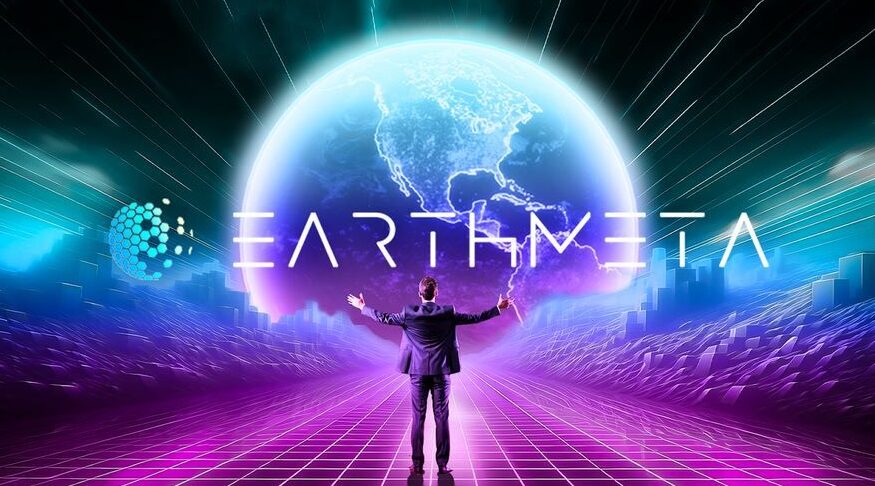The digital frontier has evolved dramatically over the past few years, transforming from simple online spaces into complex virtual worlds where digital ownership carries real-world value. As we navigate 2025, the metaverse continues to reshape our perspective on property, investment, and community building in virtual environments. Among the various platforms competing for dominance in this space, EarthMeta has emerged as a standout choice for those looking to invest in virtual real estate.
Understanding the Virtual Land Revolution
Virtual land ownership represents one of the most significant shifts in how we perceive digital assets. No longer just a speculative idea or a feature in futuristic movies, virtual land ownership is becoming a practical aspect of how people interact with the internet. This transformation has created opportunities for individuals and businesses to establish their presence in digital worlds, much like purchasing physical real estate for its strategic location and potential returns.
The concept extends beyond simple ownership. When you purchase virtual land, you’re acquiring a digital space that can be developed, monetized, and used to create communities. This land exists on blockchain networks, ensuring verifiable ownership through NFTs (Non-Fungible Tokens), making each parcel unique and tradeable.
Why EarthMeta Stands Out in 2025
EarthMeta has positioned itself as a leader in the virtual real estate space by offering something unique in the metaverse landscape. Think of it as being the mayor of your metropolis, where you set the rules, manage resources, and shape the urban landscape. This governance aspect sets EarthMeta apart from other platforms where users own static pieces of land.

The platform creates a digital replica of Earth, allowing users to purchase and govern entire cities rather than just individual plots. This technique offers a more immersive and engaging experience than standard metaverse systems, which confine ownership to smaller land chunks.
What makes EarthMeta particularly attractive is its focus on creating realistic environments and accessible design. The platform has been developed with user experience in mind, making it easier for newcomers to understand and navigate the virtual real estate market while still offering depth for experienced investors.
The Economic Opportunities in EarthMeta
The economic model of EarthMeta extends far beyond simple land speculation. Users can generate revenue through multiple streams within their virtual cities. As a city governor, you can earn royalties from land sales within your jurisdiction, creating a passive income stream that grows with your city’s popularity and development.
The platform also incorporates NFT trading for iconic landmarks and buildings, allowing users to buy, sell, and trade valuable virtual assets. Additionally, EarthMeta offers staking rewards to token holders, providing an alternative avenue for earning returns on your investment.
This multi-faceted economic approach means that success in EarthMeta isn’t just about buying low and selling high. Instead, it rewards active participation in building and managing virtual communities, creating a more sustainable and engaging investment environment.
Market Trends Supporting Virtual Real Estate Investment
The virtual real estate market is experiencing significant growth, with industry analysts projecting continued expansion throughout 2025 and beyond. Previously a speculative trend, metaverse land investments now represent a niche business with considerable potential. This shift from speculation to legitimate business opportunity reflects the maturing of the metaverse ecosystem.

Early investors who align their strategies with platform growth and community needs stand to benefit from the metaverse real estate boom. This trend suggests that successful virtual real estate investment requires more than just purchasing land; it demands understanding community dynamics and platform development.
The regulatory landscape is also evolving to accommodate digital property investment, with many regions considering frameworks that could legitimize virtual real estate as a recognized asset class. This regulatory clarity could further boost confidence in virtual land investments.
Getting Started with Virtual Land Investment
For those new to virtual real estate, EarthMeta offers an accessible entry point into this emerging market. The platform’s user-friendly interface and comprehensive governance model make it easier to understand the potential of virtual land ownership compared to more complex or fragmented platforms.
Before making any investment, it’s essential to research the specific cities or regions available on EarthMeta, considering factors such as their strategic importance, development potential, and community interest. Just like physical real estate, location matters in the virtual world, and prime digital real estate tends to appreciate more quickly.
Understanding the platform’s tokenomics and governance structure is also crucial. EarthMeta’s approach encourages active engagement and long-term commitment, making it perfect for investors who wish to construct and develop their virtual assets rather than keep them for speculation.
The Technology Behind EarthMeta
EarthMeta leverages advanced blockchain technology to ensure secure ownership and transparent transactions. The technology verifies land ownership using non-fungible tokens (NFTs), which can be exchanged on multiple platforms. Your virtual property rights are safeguarded and transferable using this blockchain basis.
The platform also incorporates artificial intelligence to enhance user experience and create more realistic virtual environments. This technology enhances city management and resource allocation, creating dynamic interactions within the virtual world that make the experience more engaging and authentic.
Integration with real-world data and mapping technology allows EarthMeta to create a more familiar and navigable virtual environment. This approach enables users to understand better and relate to their virtual properties, thereby bridging the gap between digital and physical real estate concepts.
Community and Social Aspects
One of EarthMeta’s strongest features is its emphasis on community building. Unlike platforms where virtual land ownership is primarily about individual investment, EarthMeta encourages collaboration and social interaction. City governors can collaborate to create interconnected virtual societies, sharing resources and working together on large-scale projects.
The platform hosts a variety of events and activities that bring the community together, ranging from virtual conferences to entertainment events. These social aspects help create real value for virtual properties, as locations that host popular events or serve as community hubs tend to appreciate more quickly.
This social dimension also provides additional revenue opportunities through event hosting, virtual services, and community-based businesses. Prosperous virtual landowners often discover that their most profitable ventures originate from serving the needs of the expanding virtual community.
Future Outlook for Virtual Real Estate
As we look toward the remainder of 2025 and beyond, the virtual real estate market shows strong potential for continued growth. By 2025, we can expect to see more platform innovation, including enhanced tokenization and increased adoption. Early adopters of platforms like EarthMeta may benefit from the general adoption that follows this progression.
The integration of virtual and augmented reality technology is expected to enhance the immersion and accessibility of virtual worlds, thereby increasing demand for virtual real estate. As these technologies become more mainstream, virtual properties may become as important as physical ones for businesses and individuals looking to establish their digital presence.
EarthMeta’s focus on governance and community building positions it well for this future, as platforms that can create genuine value and engagement are likely to thrive as the metaverse matures.

